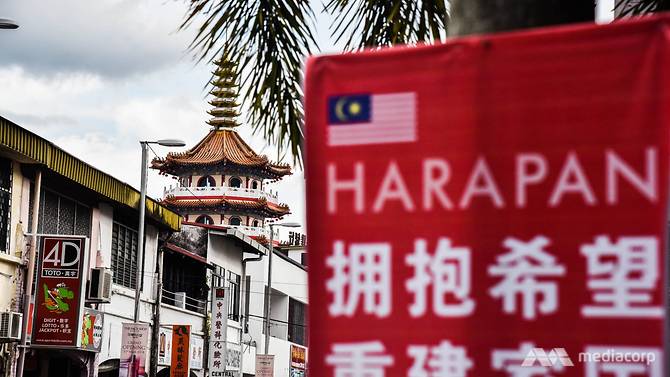- Joined
- Oct 30, 2014
- Messages
- 36,768
- Points
- 113

HOBART: The Pakatan Harapan (PH) government undertook something of historic proportions this week in the Malaysian parliament on Tuesday (Apr 9) night.
This momentous act was the attempt to pass an amendment to the first article of the Malaysian Constitution. If effected, this amendment will bring the wording in Article 1 (2) back to the original phrasing when the federation was established.
The original wording when the federation was formed:
The States of the Federation shall be -
(a) The States of Malaya, namely, Johore, Kedah, Kelantan, Malacca, Negeri Sembilan, Pahang, Penang, Perak, Perlis, Selangor and Terengganu.
(b) the Borneo States, namely, Sabah and Sarawak;
In 1976, it was changed to:
The States of the Federation shall be Johore, Kedah, Kelantan, Malacca, Negeri Sembilan, Pahang, Penang, Perak, Perlis, Sabah, Sarawak, Selangor and Terengganu.
For Sabahans and Sarawakians, it was a “downgrade” to be listed with the Malayan states. To revert to the original wording will symbolically restore the status of Sabah and Sarawak as equal partners with Malaya as the original founders of the Malaysian federation in 1963, more than half a century ago.
But the vote failed when PH could not get the two-thirds majority required to pass a constitutional amendment.
Despite this, it was a historic moment for the simple reason that the ruling government concretely endeavoured to pass a constitutional amendment to address past missteps.
What was telling was that no Member of Parliament (MP) voted against the amendment. The vote was 138 for, 59 abstentions. The magic figure was 148 votes, a shortfall of about 10 votes.

THE WILD EAST?
Sabah and Sarawak are almost completely different from the rest of Malaysia. They are physically divided from Peninsula Malaysia by the South China Sea and operate on a completely different set of political dynamics.
While Najib Razak and kleptocracy were the main issues in last year’s extraordinary general election that resulted in regime change, in East Malaysia, it was all about the Malaysia Agreement 1963 (MA63).
When the Federation of Malaysia was established by Singapore, Sabah, Sarawak and Malaya, it was accepted that all four territories were equal in political stature, although Sabah and Sarawak were vastly economically backward compared to Singapore and Malaya.
In lieu of this, a high degree of autonomy were offered to both states, giving them jurisdiction over the administration of most state matters and resources in Borneo, save for national issues of defence and foreign policy.
Sabah and Sarawak were assured of autonomy in areas like education and language (English would remain the official language), religion (Islam was not to be the official religion), immigration (they could deny entry of Peninsula Malaysians), and finance and tariffs. Collectively these safeguards were called the “20 Points”.
However, over the next half-century, owing in part to the separation of Singapore from Malaysia, the federal government became increasingly concerned over the consolidation of the federation and began to centralise decision-making, with minimal consultation with Borneo’s state governments.
Ownership of Malaysia’s oil and gas, most of which comes from Sabah and Sarawak, was given to Petronas – in return for only 5 per cent oil revenue, for example. Although oil and gas were not mentioned in MA63, the public sentiment is that these massive resources were used to develop the peninsula at the expense of East Malaysia.
There was little or no resistance as the ruling party in Sabah and Sarawak were but a small part of the Barisan Nastional (BN), the federal ruling coalition.
SO DIFFERENT FROM WEST MALAYSIA
When Mahathir Mohamad became prime minister in 1981, he further consolidated powers in the hands of the federal government.
There was no political cost to doing so; Sabah and Sarawak had such a staunch allegiance to the ruling political coalition that these territories became known as BN’s “fixed deposits”.
BN consistently won more than 80 per cent of the parliamentary seats in Sabah and Sarawak. While Sabah and Sarawak politicians might push the point, there was never any real danger that they would break faith with UMNO over the issue of MA63.

But beneath that show of unity among the BN parties, these longstanding historic grievances continued to seethe.
The reality is that Sabah and Sarawak have a unique history. These two states are completely different in terms of history, demography and culture from Malaya.
North Borneo (as Sabah was called prior to 1963) was ruled by a private company, the North Borneo Company, while Sarawak was ruled by the “White Rajahs”, a dynastic British family called the Brookes. Both were not formally colonised by the British unlike the Malay states in the peninsula until much, much later.
Moreover, the largest indigenous group in Sabah is the Kadazandusun Murut (KDM), while in Sarawak, the Dayaks. The Malays, who hold political power in the peninsula and constitute the majority, are minorities in both states.
The unbridgeable divide lies with religion. Sarawak is the only state in Malaysia where the Christians are a majority while in Sabah, Christians constitute a sizeable 36 per cent of the population. Hence, the two key features of Malaysian politics, Ketuanan Melayu (Malay Supremacy) and Ketuanan Islam (Islamic Supremacy) are way less potent in East Malaysia.
Although Muslims hold the highest office in both states, their brand of Islam is much more tolerant compared to the peninsula. There are genuine multi-racial political parties in both states and Muslims in both states have more in common culturally with non-Muslims in their own states than the Malays in West Malaysia today.
A TURNING POINT
The turning point came in the 2008 and 2013 elections. Then prime minister Najib and the BN would have lost power if East Malaysia did not support the BN.
In 2008, 55 of the 140 BN MPs came from Sabah and Sarawak. In 2013, it was 47 out of 133 BN MPs.
In just two elections, with that swing in power within the coalition favouring East Malaysia, the federal government was forced to take the demands of the 20 Points seriously. Many nationalist groups at this time also began appearing in Sabah and Sarawak.
Within a few years, MA63 became the key political issue in Sabah and Sarawak politics. Every politician became a state nationalist.
Some called for a return to the original MA63 agreement, while others called for secession from the federation. Some even claimed the federation was never valid because the British colonial authorities tricked Sabah and Sarawak into joining the federation in the first place.

State nationalism is so strong now that Sabah and Sarawak are not ruled by PH. The ruling Parti Warisan Sabah is in a mere alliance with PH while in Sarawak, Gabugan Parti Sarawak proudly tells PH its policy is “Sarawak First”.
In the Borneo part of Malaysia, these historical grievances are now a permanent feature of the politics there. In today’s social media age, these grievances can, and often do, lead to long-term political instability as a new generation takes up the fight with social media platforms amplifying resentment and unhappiness.
The failed move by Putrajaya to constitutionally restore East Malaysia’s status can best be understood as Putrajaya acknowledging missteps during the first 50 years of the federation and trying to dampen sentiments regarding secession.
The Catalan movement in Spain and its strong push for independence by way of a referendum in 2017 is a prime example how historical grievances, if not confronted early on by political leaders, can lead to crisis and turmoil. There is no reason to think this may not happen in Sabah and Sarawak a decade from now.
There is already a movement in Sarawak called SAREXIT (Sarawak exit) that holds regular demonstrations in Kuching.
The fact that the Malaysia parliament cannot even restore something as simple as the original wording to symbolise Sabah and Sarawak’s equal and founder-status in the federation has confirmed the fears of many that the Peninsula Malaysia establishment will never accept Sabah and Sarawak as anything more than one of the 13 states in the federation.
DEVOLVING POWER TO SABAH AND SARAWAK
The failure to amend the Constitution will now fuel the secessionist groups in Sabah and Sarawak who have always argued that Malaya will never accept Sabah and Sarawak as equal partners.
It is in the interest of PH government to try again soon. The people of Sabah and Sarawak need to be assured that Putrajaya is sincere in restoring their historical status. There is no other option.
If there is a lesson to be learnt here, it is that history in this part of the world can still shape events today.
Professor James Chin is Director of the Asia Institute Tasmania at the University of Tasmania and Senior Fellow at the Jeffrey Cheah Institute on Southeast Asia.
Read more at https://www.channelnewsasia.com/new...malaysia-bill-secession-ma63-sarexit-11428822
